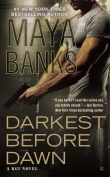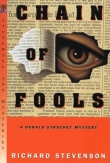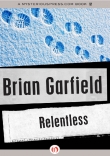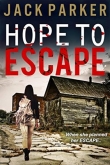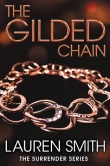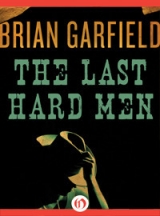
Текст книги "The Last Hard Men"
Автор книги: Brian Garfield
сообщить о нарушении
Текущая страница: 3 (всего у книги 12 страниц)
Sad thoughts: he put them away with the old .44. He picked out the swing-cylinder .45 double-action and slid it into the old holster and threw the tails of his jacket back to buckle the gunbelt around his hips and snug it down. At least the belt still fit. He hadn’t put on an ounce in fifteen years. The belt loops contained .44-40 cartridges and he had to replace them, methodically, one by one, with .45 centerfires. The old .44’s from the belt had turned green from leather corrosion.
The boxes of .30-30’s weighted down his jacket pocket. He walked out of the house with the Marlin rifle in the bend of his elbow and the revolver heavy along his thigh. Walked at a deliberate pace up to Stone Avenue and waited for the streetcar, and rode it all the way to the end of the line at Limberlost Road. It was hell hot. He walked on north toward the trees along the bank of the Rillito, half a mile along a twin-rutted wagon track through the scrub. Along the way he picked up an armload of discarded beer bottles.
He spent half an hour cruising the trees on both banks of the riverbed. Not that he expected to find lovers sparking in broad daylight in this heat. But he didn’t want stray ricochets cutting up somebody’s wandering milch cow. He found no animal life bigger than gophers, and went down into the dry bed of the river. It was deep sand, pale tan in color, marked here and there by clay bars and patches of sun-whitened pebbles. It was a wide river, two hundred feet from bank to bank, but no water where you could see it. This time of the year the water was all underneath, flowing along its underground channel beneath the riverbed. Dig down six, eight feet and you’d hit water. Come the rains in the autumn, a few hours’ rain every day for two or three weeks, and the river would be full—flash floods coming down off the hills, a savage and furious torrent. But right now it was bone dry between the eight-foot-high cutbanks.
Burgade set up the empty bottles at the base of the north bank and waded across through the sand to the south side. He thumbed a cartridge into the breech of the Marlin and then filled the magazine with ammunition. Broke open the sidegate revolver and chambered six into it, and holstered it with the firing pin between the rims of two shells. He was too old a hand to get careless at this stage of his life: leave the pin over a live primer and you never knew when the thing might fall out of the holster, drop on a rock and go off.
He took his time practicing, conserving his ammunition. Dry-fired more that he shot. He had to familiarize himself with the old moves and balances all over again: it had been a long time, muscles remembered but not to the exact point.
He had to quit twice to forage for beer bottles. Late in the afternoon the noise attracted an audience of half a dozen kids, who stood on the bank behind him and watched solemnly. He said hello to them, courteous and distant, and one or two of them knew who he was, passed the word around; nobody pestered him. The kids volunteered to go looking for more bottles for him and he sat in the lengthening shade while they scooted through the trees, found cans and bottles, and raced each other across the river to set up targets for him.
He was not above showing off. He finished the afternoon in a blaze of glory, like fireworks: started with his back to the targets; jacked a chamber into the Marlin; wheeled and began firing at an earsplitting speed, so that the racket of each shot nearly blended into the next; the air was full of flying pieces of glass. When he had emptied the carbine he let it hang in his left hand while he slapped the revolver up from his hip and blazed away, holding the revolver out in front of him at eye level where you were supposed to. He didn’t miss one of his six shots. When he walked away toward town the kids were watching him as if he were William S. Hart. He didn’t let them see his pleased little smile.
His ears were still whistling and ringing when he walked up. to his front door and went inside. Susan appeared at the kitchen door and began to say something, and saw his guns and stared.
“Just practicing,” he said. “Up on the Rillito. I had to wait awhile for the tram car. Didn’t realize it was getting so late.”
I’ve waited supper for you.” She pushed her lower lip forward to blow hair off her forehead. “Lay off your things and get washed up.”
“Yes, ma’am,” he said dryly. Susan grinned impudently. He put the guns in the front parlor, leaving them out because after supper he would clean them and oil them; he went upstairs, feeling very light on his feet, and worked the pump handle to bring water up to the second-story tank before he went into the bathroom they had built four years ago.
His clothes were covered with dust. He chastised himself for not having changed into old clothes before he went out to shoot. He had to change; it wouldn’t do to sit down to supper in dusty garb.
When he came down she said crossly, “It’s getting cold. Maybe I’d better warm it up in the oven.”
“No. I don’t mind” He held her chair for her and then went to his place at the head of the table. As he sat down he saw she was looking at the grandfather clock. He said, “If you’re going out tonight I’m sorry I held you up.”
“There’s time,” she said. “Maybe I’ll cancel it anyway.”
“The Brickman fellow?”
“Yes.”
“He’s a good man, you don’t want to keep putting him off.”
She said, “Quit trying to marry me off.”
“Time you got another man, Susan. Time you got married again.”
She was thirty-one, a tall girl with big eyes and good bones, high strong cheeks, a full expressive mouth. He was too close to her to know whether she was pretty but he’d heard men make admiring remarks about her. She had long hair that shone in the lamplight, dark brown hair like his own had been before it went white; her eyes were dark and dramatic and she had a soft contralto voice, low and smoky. Winters she taught fifth grade; summers she kept the books of the city police department. Nine years ago, to Burgade’s intense displeasure, she had married an unambitious young deputy sheriff named Ned Hayes; Burgade had only slowly, and grudgingly, realized Hayes’s virtues—he was steady, honest, dependable, not as dull as he looked at first glance, and had a good chance of making undersheriff and possibly even sheriff. Burgade had finally learned to like him and had taken Hayes under his wing, teaching him the bits and pieces of wisdom he had picked up along the backtrail of his experience. Two years ago last month Hayes had made undersheriff. A fortnight later Hayes had been shot dead by a store burglar when he’d stopped to investigate on his way home from a night of card-playing at the Cosmopolitan.
Burgade had brought Susan back home with him. She had cried her grief out but she’d composed herself rather quickly after the funeral—perhaps too quickly. He had a feeling some of it was still bottled up inside her. Very matter-of-fact, she’d gone to work, organized the house-hold, mothered him insufferably, and made utterly no efforts to resume the social contacts she’d had before her husband’s death. Her old friends, her age, had come around to see her but she had greeted them with exact courtesy, nothing more, and they came around less and less frequently. She encouraged no beaux. Once in a while a young man made a determined attempt to get through to her. The most recent was a young mining engineer, Hal Brickman, who had a clean-cut college-dude appearance and usually went around in baggy riding breeches and a snap-brim Eastern hat. Brickman had a good heart and a quick mind; maybe he wasn’t the kind of tough outdoorsman who’d always run in the Burgade family (Sam Burgade’s forebears had fought in four American wars, explored the Northwest with Lewis and Clark, trapped with Carson and Sublette, trailed cattle with Chisum) but he was solid, substantial, steady, sturdy—and Susan was thirty-one years old, and all these things weighed in Sam Burgade’s considerations.
In reply to his remark about getting married she said, “I wish you’d quit trying to run my life, Father.”
“I’m not telling you what to do. I’m telling you what in my judgment you ought to do. There’s a difference.”
“I don’t love Hal Brickman.”
“Seems he loves you,” he said. “Maybe at your age you ought to stop looking to find a storybook romance and settle for something that could turn out to be just as good in the long run—a steady man who loves you and a kid or two to raise and love.”
“It terrifies you to think of me drying up into an old-maid spinster, doesn’t it?”
“Susie, I’m an old man and I know about loneliness. I don’t wish it for you.”
Her expression changed; she looked away quickly, addressed herself busily to her meal. Her lashes covered her eyes but he thought he had seen a moist glint in them. He pushed his chair back and held his arms stiff, braced against the edge of the table. Full of sudden low anger he said, “Goddamnit, Susie, I will not have you waste your young life looking after a tired old man like me. I had no intention of letting that comment about loneliness give you any excuse to think I need you to look after me for the rest of my life. I can damn well take care of myself. I did while you were married.”
“You were younger then,” she said in a small voice, not looking up.
“When I’m too old and feeble to look after myself,” he roared, “I’ll move myself in the goddamn Pioneers’ Home.”
“Don’t blaspheme, Father.”
He snorted. “I will not have it.”
She looked up, finally. “You’ll have to throw me out, then.”
“Don’t think I won’t.”
“Then go ahead. Do it.” Her eyes blazed.
Their glances locked: they scowled furiously at each other until Burgade’s nose twitched, his lip-corner turned up, and suddenly they were both laughing helplessly. He laughed till his stomach hurt; he had to get his breath, and then he dropped his napkin on the table and went to the sideboard and got down the cognac. Rothschild 1887. He poured two snifters.
“Here. Belt that down and listen to me.”
“You old tyrant.”
“Yeah.” He sat down and a crafty gleam came into his eye. “You know what I’m going to do? I’m going to put this house up for sale.”
“What? The house? But—”
“I know. You were born here. Well, that was a long time ago. The house is too big, we don’t need it. It just keeps you hopping. I’m going to sell it.”
“And do what?”
He grinned at her. “Move into a flat in Orndorffs Hotel.”
She glared at him, but she was amused. “You old stinker.”
“Yeah. Won’t be room for you there, Susie. I’ll have maids to keep my room clean and a whole hotel kitchen to cook for me. I won’t need the likes of you fussing around after me.”
“You’re bluffing,” she said, “but I love you.”
“I am not bluffing. Next week the house goes up for sale.”
“Do it if you want,” she said, feigning indifference. “But don’t do it on my account. If you really can’t stand having me around, I’ll leave. You don’t have to sell the house.”
“Is that a promise?”
“It is if you’re asking for it.”
Loneliness pressed at him from unseen shadows. But he said, “I’m asking for it.”
She was studying her hands, turning them over, again and again as if they were unfamiliar objects she’d never seen before. “All right,” she said in the same small voice. “All right, Father. But it doesn’t mean I’m going to marry Hal.”
The door clapper banged three or four times. Burgade put down his brandy snifter. “That’ll be your young man. Better get your shawl—there’ll be a cool breeze along the river tonight.”
Her eyes flashed. “What makes you think we’d go walking in that notorious lovers’ lane?”
He only grinned at her. Color filled her cheeks and she went out of the room in a rush. But he noticed she was moving with a light step. Still smiling, he went to the hall door and greeted Hal Brickman while Susan dashed upstairs to get her wrap. Hal wore the customary jodhpurs and engineers’ boots, a charro jacket and a necktie; he had his snap-brim hat in his hand; his hair was slicked back, parted down the middle. A real dandy—but amused by it, not serious about it. Burgade didn’t understand dudes very well but he liked Hal. They sat in the parlor with brandy and talked weather and crime until Susan came down, her hair freshly brushed and shining, her mother’s lace shawl about her shoulders. She looked a little like her mother—not much, but enough to send Burgade’s memory back twenty years.
Hal was saying, “I imagine they’ll catch them before the week’s out.”
Hearing the last of it as she entered, Susan said, “Catch who?”
“Oh, just some convicts who broke out of the penitentiary,” Hal said.
“Oh,” she said, not interested. She came into the room and Burgade rose gallantly from his chair; she pecked his cheek and let Hal take her arm and guide her toward the door. Hal said, “Good night, sir.”
“Always good to see you,” Burgade said.
Susan hesitated. The pink tip of her tongue quested her mouth corner. “Would you like anything from Porter’s store? It’ll still be open.”
“No. Nothing, thank you. And if I did I could get it myself.”
“Don’t be cranky,” she said tartly. “Nothing—that’s your trouble right now, you know. You want nothing.”
Not altogether true, he thought. Right now he wanted Zach Provo. Or perhaps what he wanted was the excitement of the challenge.
They stood a moment in uncomfortable silence, Susan reluctant to leave, until Burgade turned and stared rudely at the bookcase as if dismissing them from his mind and looking for something to read.
“Well,” Susan said uncertainly, “good night, then, Father.”
“’Night,” he mumbled, and took a step closer to the bookcase.
His daughter went out with her young man. Through the window he watched them go along the walk under the gaslight poles. In response to something Hal said, Susan laughed with an open throat; she seemed healthy and girlish, she touched the ground with toes like musical notes. Burgade saw Hal slip his arm around her waist.
He took down the guns and began to clean them. The air in the room was still and close: stale, as if it hadn’t moved for a long time. Full of loneliness. Burgade spread the pieces of the guns on a sheet of newspaper; he sat crosslegged on the floor like an Indian and wiped each bolt and spring and cam with an oily scrap of cloth. The room seemed to grow larger and quieter. In his mind he tried to reconstruct a portrait of Zach Provo. It had been twenty-eight years and the image was difficult to resurrect. Perhaps the man had lost his hair, although that wasn’t common among Navajos. But then Provo wasn’t fullblooded. Perhaps he had gone to fat—but that was hard to credit. The face had been bladed like a hatchet. Hard sinister eyes like two holes burned into a hide. Skin the hue of tarnished copper. It was coming back: the long jaw you could scratch a match on, the heavy black eyebrows, the lean slightly hunched body with its tense quickness of long-corded musculature. A man like that, how much would he change in twenty-eight years? Had prison collapsed the mouth, faded the eyes, thinned the hair, made the hard brown body flabby? Changed the tough, taut, commanding pressure into flaccid weakness? It wasn’t possible. Not Provo. A man like that, hardship wouldn’t grind down; it would only polish him up, like hard steel against a grindstone.
But maybe that was just a hope. Maybe he wanted Provo to be faster and tougher than ever. To increase the challenge.
I’m going to nail him, Sam Burgade thought, but he felt a little ashamed. He didn’t hate Zach Provo; he didn’t really care one way or the other about Provo. It was only that Provo gave him something to think about besides lonely old age.
I hope they don’t get him before I get a crack at him.

Three

Provo stood in the open door of the laborer’s shack watching the lights of Gila Bend, waiting for Menendez to return. There was always the chance Menendez wouldn’t come back at all, would just light out and keep going. But he didn’t think so. He’d put a bug in Menendez’s ear about that Santa Fe gold cache up on the Mogollon and he had a feeling Menendez would stick to him like a saddlebur until Menendez got near that money.
The two Mexican laborers who occupied the shack had showed up just after dark. Provo had let them come inside and then jumped them. Portugee had wanted to kill them with their own knives but Provo had called him off: leave a trail of corpses and they’d only bring more trouble down on their heads—Pinkertons, the Army. The laborers lay back in a corner, trussed with their own belts and ripped-up shirts, gagged, sweating their terror into the stifling suffocation of the hot overcrowded room.
It was a long wait and Provo got uneasy. But somewhere around midnight Menendez came from town, riding a horse at a skittish walk. There was a heaped bundle tied on behind the saddle. For a moment Provo wasn’t sure—he kept inside the dark doorway with his riot gun ready—but it was Menendez all right.
Menendez drew rein by the door. Up close in the starlight Provo could see he was wearing range clothes, Levi’s and a plaid shirt, and his ankle irons and chains were gone. Menendez’s waistline bulged with four or five gunbelts and holstered handguns.
Provo said, “Can’t you hold that horse still?”
Taco Riva squeezed out through the door past him. “Let me have him.” Taco’s passion was horses. He spoke soothingly and rubbed the horse’s face before he took a gentle grip on the bridle.
Menendez dismounted. “Damn town’s crawling with law.”
“We’ve got to expect that.” Provo helped carry the heavy poncho-wrapped booty inside. “You did fine.”
“Bet your ass I did. I hit the es-smithy first. Got us three hacksaws and all the spare blades I could ef-find. I had to cot my chains off before I could move on—sonoma-bitches was making enough racket to wake the dead, and there’s a focking deputy on every damn corner in town. That there bondle’s clothes, shirts and pants. Took ’em out of the storeroom behind the dry-goods. Got these gons there too—only ones I could ef-find. I din’ dare go near the gonsmith es-shop, there was a deputy right out ef-front.” He chuckled. “This town goeen to be plenty pozzled in the morning.”
There was an hour of cursing and painful hacksawing before they got rid of the leg irons. Some of the clothes didn’t fit too well but they’d do for openers, Provo judged. He buckled on two of the revolvers and slung a third one across his shoulders like a bandoleer. Lee Roy took offense. “What about the rest of us, for Christ’s sake?”
“I’ll pass the ordnance around when I’m good and ready, Lee Roy.”
“Shee-yit.”
Provo said to Menendez, “You scout the livery barn?”
“No good, Zach. Too much law around there. But there’s ten, twelve horses in the ranch stable half a mile north of town, across the tracks. That’s where I es-stole this one.”
“Then that’s where we go now. Lead the way.”
Slow and easy. He let Taco go into the stable alone and saddle up eight horses; Taco was good enough with horses not to raise a ruckus. When he came out of the dark maw of the stable he crouched down by Provo and whispered, “Mos’ly tired old horses, Zach. Tame and slow—but what you expect on a dairy ranch?”
“They’ll do. All set?”
They rode out, swinging wide around Gila Bend; rode south all night, into the Saucedas, and at dawn raised the smoke of a country store’s cookfire. The place squatted in’ a little nest of spring-fed trees in the barren rock mountains. Provo went in at gunpoint, surprised the old store-keeper and his two hired hands, and called the men in. They tied up the locals and ate a huge meal. Provo ate by himself in the kitchen, reading the newspaper Menendez had picked up in Gila Bend last night. His face changed as he read.
They took what they wanted and made off with all the money in the place—ninety dollars—and drove off all the horses and mules, to set the locals afoot and insure it would take two or three days for word to get out that they had passed this way. Provo led them out southward, toward Ajo, and kept to that course until they had gone well beyond sight of the country store. Then he turned east along a hardpan flat where hoofmarks would be hard to track. Sooner or later the pursuit would get to the country store back there; Provo wanted the law left with the impression the fugitives had struck due south for the Mexican border.
They nooned somewhere on the northern quadrant of the Papago Reservation with Tabletop Mountain in sight to the northeast. It was all rock and scrub here, worthless land beaten by the furious sun. Provo’s eyes were gritty from lack of sleep; he’d been up fifty-odd hours. They slept the rest of the day, Provo trading off sentry hours with Menendez. The rest of the crowd seemed too bone-tired to complain about anything.
Toward sundown, he got up and stretched, hearing the ligaments crack, and walked off a piece with Menendez. He showed him the three-column story on the front page. Menendez read it laboriously, his lips moving. Finally he said, “Oh, sure. Sure.”
“Yeah,” Provo said. “Eighty thousand dollars with Sam Burgade guarding it.”
“Ain’t no co-een-cidence, Zach. You know it’s a focking trap.”
“Sure. That’s the way the old bastard’s mind works.”
“They can’t catch us so they want to draw us into Tucson.” Menendez pronounced it the Spanish way, Tooksohn. “They’ll be waiting with every gon in town.”
“Be a shame to disappoint old Sam Burgade, wouldn’t it?”
Menendez blinked at him. “You ain’t seriously thinking about goeen in there, Zach.”
“Not into Burgade’s trap, no. But we’re going into Tucson.”
“You got your brains op your ass or what? They’re waiting for us with everything they got.”
“They’re waiting for us to hit that so-called money shipment. Friday morning when Burgade picks it up at the train depot and trucks it over to the bank. What’ll you bet there ain’t no real money at all? Just an empty box for them to lug along to make it look good.”
“Sure. So why you talking about Tucson?”
“Because come Friday morning, every gun in town will be lined up at the depot and along Congress Street and at the bank. They’ll have every inch of that street covered. You know what that’s got to mean. It means they’ve got to pull deputies and bank guards off every other cash vault in town. Off the express office, off the mercantile savings-and-loan, off the hotel cash tills and the company payroll offices. Friday’s payday, right?”
Menendez smiled slowly. “If you don’t beat all, Zach.”
It was then Tuesday evening. They spent the next forty-eight hours moving into position and equipping themselves according to Provo’s plan. Thursday afternoon they made camp in Rose Canyon, in the Santa Catalinas fifteen miles northeast of Tucson. A crystal creek trickled down from canyons higher up, crowding the defile with greenery; it was cool among the trees. Provo sent young Mike Shelby into Tucson to reconnoiter—Shelby was the one least likely to be recognized, he looked like any honest dumb young cowboy, and Provo could trust him to come back. Provo had spent an hour in Tucson last night, after dark, riding the back streets of the mercantile and warehouse sections, scouting targets. He had kept his coat collar up and his hatbrim down and nobody had paid him any attention. He had even drifted along the street within a block of Sam Burgade’s house, scouting the place out. He’d had plenty of time in Yuma to read every newspaper scrap about Burgade over the past twenty-eight years, and he’d picked the brains of every new prisoner. He knew a lot about the man, considering he hadn’t seen him in twenty-eight years. He knew where Burgade lived and what his daily habits were. He knew Burgade’s daughter lived in and kept house for the old man. He even knew that on Friday mornings Susan stayed home from her part-time job to do her thorough weekly housecleaning and laundry.
They had outfitted themselves in various village stores, going in in pairs, not attracting attention, buying what they needed with the cash they’d pilfered from the country store back in the Saucedas. Menendez wore an old straw hat that had turned an uneven brown—he’d stolen it off the hat rack in a café in Marana yesterday noon. Provo wore black stovepipe boots up to his knees, an old-fashioned brown linen duster that came down as far as the boot tops, and a peaked five-gallon hat. It was a sinister costume and he’d picked it for effect. Portugee and Lee Roy had lifted what explosives they needed from a mining construction shack up near Oracle in the Catalinas, and Menendez had augmented the arsenal with rifles and revolvers from the back room of a Marana gun shop. The theft would have been discovered by now but nobody had any reason to connect it with the fugitive convicts.
Shelby arrived at sunset, dismounted, and turned his horse over to Taco Riva. He reported:
“You were right, Zach, our best bet’s got to be the smelter mill. It’s away over west of town, a mill west of the area they’ll guard when the train comes in, and it looks like they’re gonna pull the guards off it for the train depot. They got a big old safe in the back room behind the paymaster’s office and I guess they must keep a pretty good wad inside—they pay off every first and third Friday of the month and tomorrow’s the third Friday in July. Four-, five-hundred man payroll—got to be at least twenty thousand dollars in there. Be easy to move in and out if we come down through the canyon back of the smelter. Right up to the back door of the paymaster’s office. Won’t be but half a dozen men in sight of us and none of them armed.”
Provo stood back against a tree, thumbs hooked in the front pockets of his trousers. His face was hard, ungiving, a blue-steel hatchet. “Then there it is, you gents. Twenty thousand to split—more than two thousand apiece. A man can go a long way on two thousand dollars. What do you say?”
Lee Roy said, “You asking us or telling us?”
“I’m asking you now, Lee Roy. I can’t force you all to help me rob the paymaster.”
“Then how come you din’ ask us before?”
“I had to keep us together. It was no time to take a vote.”
George Weed said, “Hell, quit jawing. We’re all with you, Zach. And if Lee Roy don’t like it he’ll get all eight of us on his neck.”
Lee Roy said sarcastically, “I’m real timid, George. I’ll shake like a leaf if you threaten at me again.”
“Gentle down,” Provo murmured. “I’m going to pass the guns around later tonight and I don’t want you people using them on each other.”
Lee Roy’s feral face became crafty. Provo knew what he was thinking. Well, that was all right. He wasn’t going to give Lee Roy any guns, but Lee Roy didn’t have to know that until the last minute. In the meantime the anticipation would keep him quiet.
“It’s going to take timing and brains,” Provo told them. “First off, we’ve got to time it to go with the train schedule. This so-called money train pulls in tomorrow morning at nine. Well hit the smelter paymaster not later than ten minutes after nine. Now, at nine o’clock exactly, Mike Shelby’s going to be on the Casa Grande road north-west of Tucson and Quesada’s going to be on the Benson road east of town. At four or five minutes after nine you two will cut the telephone and telegraph wires at both ends of town. That’s what we stole these two-dollar watches for. Now, once you’ve cut the wires you’ll ease around wide and make your way right back here where we stand now. This is where we’ll meet afterwards. Right here at noon sharp. Then we divvy up the money and go our separate ways. Meantime, while these two are cutting the wires, the rest of–”
Quesada said, “How do you cut through them wires, Zach? Them poles hard to climb.”
“No trouble. They only run seventeen poles to the mile, Joaquim. The rest’s held up by cactus and mesquite. You’ll find a low spot easy enough. Use your hacksaw.”
Quesada gritted his neat white teeth. The back of his neck was red. He sat down, grunting with burly effort, losing interest in the rest.
Provo said, “Will Gant rides down below the smelter to cut the telephone line between the smelter and town. That leaves six of us. We go into the paymaster’s office and tie everybody up, with gags. Lee Roy blows the safe open with the blasting gear. We clean it out and get to our horses fast. When we light out, we head down the road and pick up Will Gant and cut straight across the north side of Tucson.”
Lee Roy said, “You crazy in the head. Right acrosst the damn town? Why not fade back into them mountains back of the smelter?”
“Because I say so, Lee Roy.”
At four in the morning he kicked them awake and passed the guns out. When Lee Roy didn’t get one there was a dangerous moment. Lee Roy exploded in a few choice phrases and tended his bony fists. Provo had to level a gun on him. “You’ll have your hands full with blasting powder.”
“That ain’t no goddamn call to–”
“Shut up, Lee Roy. if you want me to spell it out, I don’t want you behind me with a gun. I don’t trust your hillbilly ass, understand? You don’t need a gun. Just blow the safe, that’s your job. It’s worth better than two thousand dollars to you.”
“How do I know you ain’t gonna kill me after?”
“If I was going to kill you, Lee Roy, I wouldn’t have dragged you all this way alive, would I,” he lied.
Will Gant took Lee Roy by the arm and spun him around. “Quit acting like a fool.”
Lee Roy stalked off to his horse in high dudgeon. Provo caught a corner of Menendez’s dry glance in the starlight and wheeled to his horse. “All right. Let’s move.”
There was always the chance a horse would throw a shoe and go lame, or some other delay would crop up. Provo gave it plenty of time to cover possibilities. They reached the canyon behind the smelter a full hour ahead of time. He checked his watch and dismounted them, eased himself down with his back against a rock, and felt idleness trickle through his muscles. Lee Roy’s resentful glance lay against him, harsh and baleful; Provo ignored it. Menendez crouched right beside Provo and spoke low:
“This idea of yours, goeen right across Tucson after we pull it off. That got something to do with Burgade?”

